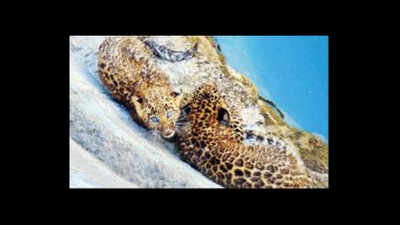Trending
This story is from January 20, 2018
Leopard cubs rescued from well reunite with mother in Junnar

The forest department rescued the cubs from a 15ft deep well.
PUNE: Two five-month-old leopard cubs were rescued from a 15 feet deep well in a two-hour operation carried out by teams of Wildlife SOS and the state forest department at Gatwadi in Otur of Junnar taluka, about 100km from here.
The cubs were trapped inside the well for almost 10 hours. A farmer first spotted them on Thursday afternoon and reported the matter to the forest department as well as the range forest officer (RFO) of Otur.
A team from Manikdoh leopard rescue centre, along with Wildlife SOS, rushed to the spot and rescued the leopard cubs.The duo were extremely stressed and exhausted. They were kept under observation for a few hours and later successfully reunited with their mother.
Veterinary officer Ajay Deshmukh of Manikdoh Leopard Rescue Centre told TOI over phone, “Having enough experience in successfully reuniting leopard cubs with their mothers across the state, we had kept the two cubs in a safe box. After a few hours, a female leopard emerged from the neighbouring sugarcane fields and took away the cubs.”
“Unfortunately, due to habitat loss and encroachment, these wildcats are forced to find safe cover in sugarcane fields,” Deshmukh added.
Range forest officer, Otur, Sachin Raghatwan said, “Otur is a leopard-prone area. These animals frequent the villages in the neighbourhood in search of easy prey such as poultry and livestock. This often leads to conflicts but we work closely with Wildlife SOS to tackle such incidents.”
Kartick Satyanarayan, the co-founder and chief executive officer of Wildlife SOS, said, “It is a matter of great concern for us as the wild animals such as leopards continue to become unnecessary victims of uncovered wells. Without the support and understanding of local communities, it is almost impossible to address this issue. We need a holistic and sustainable solution, so that local communities cooperate with the forest department in covering the wells.”
The cubs were trapped inside the well for almost 10 hours. A farmer first spotted them on Thursday afternoon and reported the matter to the forest department as well as the range forest officer (RFO) of Otur.
A team from Manikdoh leopard rescue centre, along with Wildlife SOS, rushed to the spot and rescued the leopard cubs.The duo were extremely stressed and exhausted. They were kept under observation for a few hours and later successfully reunited with their mother.
Veterinary officer Ajay Deshmukh of Manikdoh Leopard Rescue Centre told TOI over phone, “Having enough experience in successfully reuniting leopard cubs with their mothers across the state, we had kept the two cubs in a safe box. After a few hours, a female leopard emerged from the neighbouring sugarcane fields and took away the cubs.”
Female leopards are over-protective about their cubs and can retaliate with aggression if they are unable to locate their offspring. Such incidents give rise to man-leopard conflicts.
“Unfortunately, due to habitat loss and encroachment, these wildcats are forced to find safe cover in sugarcane fields,” Deshmukh added.
Range forest officer, Otur, Sachin Raghatwan said, “Otur is a leopard-prone area. These animals frequent the villages in the neighbourhood in search of easy prey such as poultry and livestock. This often leads to conflicts but we work closely with Wildlife SOS to tackle such incidents.”
Kartick Satyanarayan, the co-founder and chief executive officer of Wildlife SOS, said, “It is a matter of great concern for us as the wild animals such as leopards continue to become unnecessary victims of uncovered wells. Without the support and understanding of local communities, it is almost impossible to address this issue. We need a holistic and sustainable solution, so that local communities cooperate with the forest department in covering the wells.”
End of Article
FOLLOW US ON SOCIAL MEDIA










